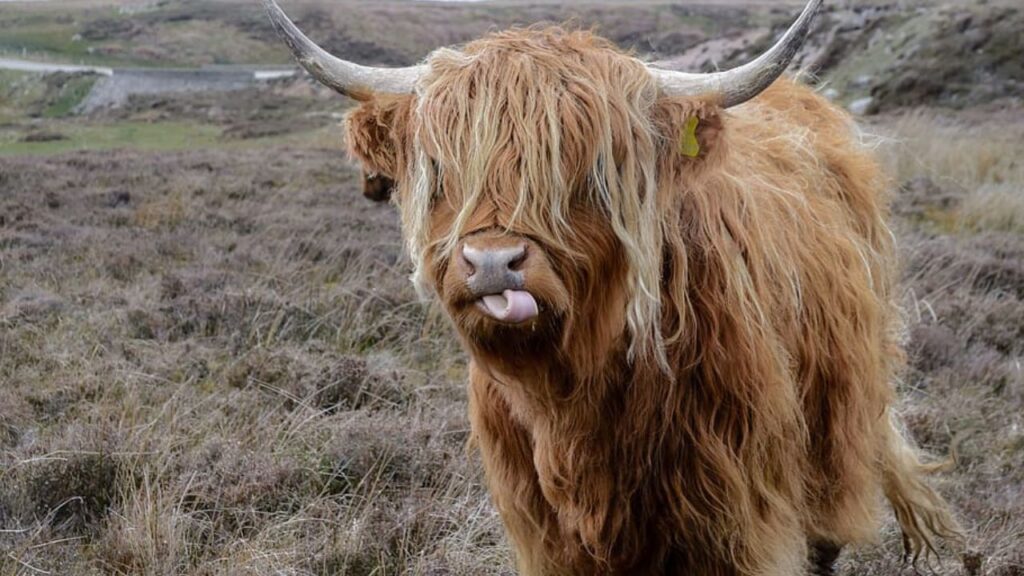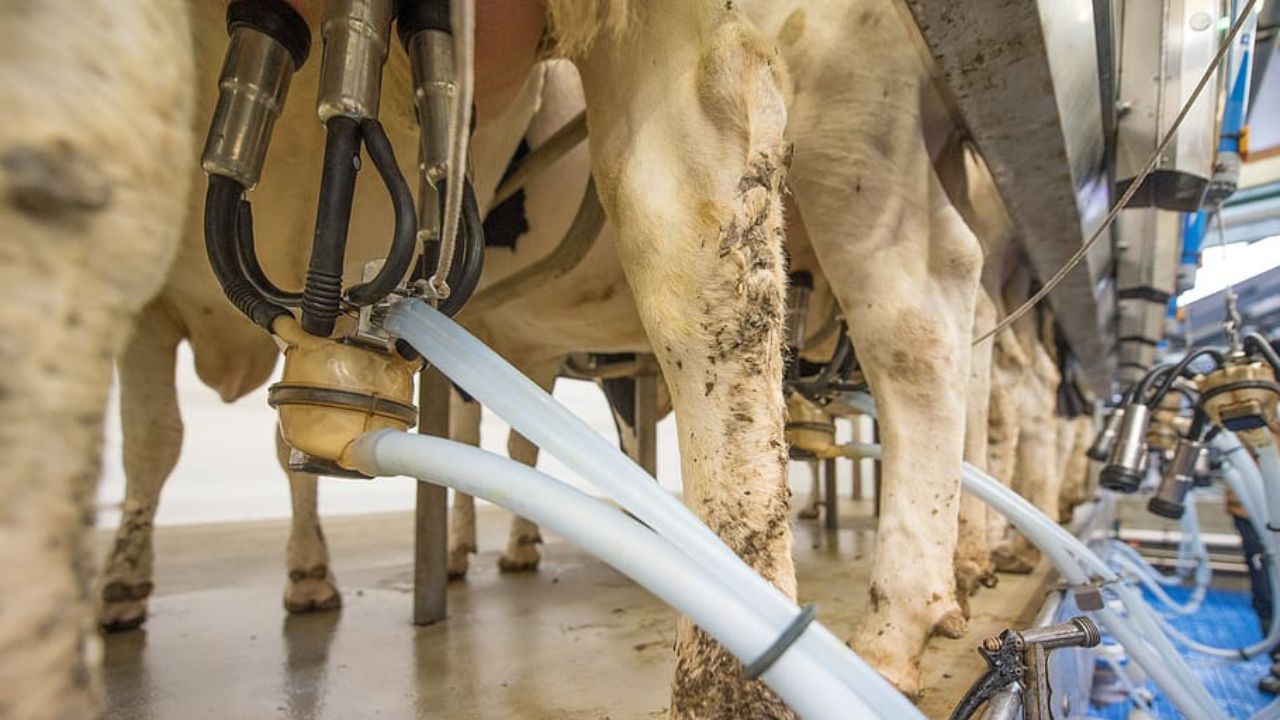Do Highland Cows Produce Milk? Yes, Highland cows do produce milk, but they are not typically used for commercial dairy production.
Highland cows, with their sweeping horns and long, shaggy coats, are a fascinating and iconic cattle breed. These tough animals, born in Scotland’s rugged highlands, have adapted to living in some of the harshest climates on the planet.
Their distinctive appearance and the way they’ve adapted to living through cold weather have captured the attention of farmers, animal enthusiasts, and even the general public worldwide. But one of the most frequently asked questions is always: Do Highland cows produce milk?
In this in-depth article, we will discuss the milk production of Highland cows, their diet, and why they are not used often in commercial milk production. [Do Highland Cows Produce Milk?]
In addition, we will also discuss the advantages of Highland cow farming in terms of the environment and why other people prefer them over other cattle, despite their yields being relatively low.
Contents
What Are Highland Cows?
Prior to answering the question of milk yield, it is imperative to realize the peculiarities of Highland cattle that differentiate them from the rest of the cattle breeds.
Physical Characteristics
Highland cattle are renowned for having long, shaggy coats that help them protect against extreme weather conditions. Their coat can be reddish-brown, but other color variations in them include black, white, or even silver.
The hair covering their body is very thick and offers insulation layers that act as a form of protection during very cold weather by keeping the inner body very warm when outside at temperatures below -10°F (about -23°C).
In addition to their thick coats, Highland cows also have wide, curved horns that extend outward, adding to their distinctive appearance.
They are not merely for show but are functional, used by the cows in their natural behavior, whether that is foraging for food or defending themselves.
Their strong, muscular build and hardy nature make them perfectly adapted to browsing on rough mountainous terrain. [Do Highland Cows Produce Milk?]
Despite their menacing looks, Highland cows are rather famous for having a gentle and docile temperament, which, in turn, makes them relatively easier to handle, particularly under small-scale agriculture conditions.
History and Origin
Highland cow originated from Scotland, where they were formerly kept by Scottish farmers and Highland clans for their meat, milk, and wool.
Highland cattle trace their lineage to the 6th century and were originally bred for resilience against Scottish Highland weather conditions. [Do Highland Cows Produce Milk?]
The Highlands has been domestically kept on Scottish small farms for centuries, where they were the staple of Scottish agriculture.
Highland cattle played a vital role in the Scottish Highlands’ ecosystem’s equilibrium. Highland cows were particularly well-suited to feed on coarse, rocky terrain and were often used to take cover away from plants where more delicate livestock would be killed.
Their fame eventually caught up with them, and they became a symbol of Scotland’s rural heritage. [Do Highland Cows Produce Milk?]
Today, they can be seen everywhere in the world, from America and Canada to New Zealand and Australia, wherever there are farmers looking for robust cattle breeds.
Do Highland Cows Produce Milk?
And now, the nitty-gritty of the issue: Do Highland cows produce milk, and if so, why is their milk unique?
Milk Production in Highland Cows
Yes, Highland cows do produce milk. Like other cattle breeds, Highland cows are mammals and will produce milk following the calving of their calves.
However, unlike more conventional dairy breeds like Holsteins or Jerseys, Highland cows are not renowned for high milk production. [Do Highland Cows Produce Milk?]
Highland cow milk is rich and creamy due to its high fat content, giving it a rich, luxurious texture. This makes it extremely well-suited for small-scale dairy farming, where high-quality rather than high-volume milk tends to be the focus.
Highland cow milk is used in a variety of dairy products, but it is most appealing due to its fat content, which makes it best used in making butter, cream, and other high-fat dairy products.
Milk Yield Comparison
While Highland cows do produce milk, they are not necessarily high producers. On average, a Highland cow will produce around 4 to 6 gallons of milk per day when in lactation, significantly lower than other breeds like Holsteins that can produce 8 to 12 gallons of milk per day.
Their relatively low milk yield makes Highland cattle less appealing for high-volume, large-scale commercial dairy farming. Highland cattle are instead utilized as much for beef production, in which case their beef is highly sought after for its flavor and palatability.
However, Highland cattle can also be an important asset for smaller-scale, craft-style dairy farms focusing on quality instead of quantity. [Do Highland Cows Produce Milk?]

Highland Cow Milk: Is It Used Commercially?
Although Highland cows give less milk, their milk does find a niche. Let us explore the reasons why Highland cow milk is not used commercially in mainstream dairy production and how it is utilized in more specialized industries.
Limited Commercial Use
Among the reasons Highland cows are not commonly used in large-scale commercial dairy farming is their low yield of milk. [Do Highland Cows Produce Milk?]
Dairy farming, particularly commercial production, thrives on the grounds of high yields of milk to meet consumers ‘ demands. Breeds like Holsteins are bred specifically for the purpose of producing large quantities of milk, thus more ideal for large-scale production.
Highland cows’ milk simply isn’t produced in the quantity required to feed commercial dairies. Highland cows’ milk is perfect for specialty markets and small-scale dairy farms that specialize in producing high-end, artisanal products, however.
For small-scale producers, Highland cows provide a unique opportunity to market high-quality, specialty dairy products to consumers who appreciate the richness and flavor of this milk.
Specialty Dairy Products
Although unsuitable for large-scale milk production, Highland cow milk is used to make specialty dairy products such as high-fat cream, butter, and handmade cheeses.
Highland cow milk’s rich, full-bodied character is especially prized for making products that have a richer, creamier texture than other breeds’ milk. [Do Highland Cows Produce Milk?]
Other farmers even market Highland cow milk products as luxury or premium products, appealing to consumer demand for high-quality, locally-produced dairy products.
Highland cow milk is also in demand among some gourmet groups, where chefs and food enthusiasts enjoy its unique flavor and high fat content, making their dishes more luxurious.
To summarize, Highland cows are not the workhorse of the dairy business, yet their milk fills a very useful role in niche, specialty markets. Their milk is valuable because of its novelty and quality and is thus suitable for artisan dairy production.
See Also: What Part Of The Cow Is Hamburger Meat? Secret Behind
Health Benefits of Highland Cow Milk
Beyond its rich texture and intense flavor, Highland cow milk also possesses some remarkable health advantages. Let us talk about the reasons that make Highland cow milk a healthier choice for health-aware customers.
Higher Fat Content
One of the characteristics that distinguish Highland cow milk is that it is fatter. Highland cow milk is more butterfat than milk from other cows. The fat in Highland cow milk is particularly desirable for the production of butter and cream.
The richness in the milk makes it more satiating and filling than that of dairy breeds that have a high production level. [Do Highland Cows Produce Milk?]
Additionally, the extra fat content in Highland cow milk makes it an excellent choice for anyone who loves a richer, fuller flavor. For those customers looking for milk that is decadent yet nutritious, Highland cow milk is in a league of its own.
Rich in Essential Nutrients
In addition to the high fat content, Highland cow milk is also rich in essential vitamins and minerals like calcium, vitamin A, and omega-3 fatty acids. [Do Highland Cows Produce Milk?]
The extra fat in the milk helps in the absorption of fat-soluble vitamins like vitamins A and D, making it a more nutrient-rich product than lower-fat milk from other cattle.
Certain studies suggest that milk from grass-fed cows, such as Highland cows, may be rich in more beneficial omega-3 fatty acids and conjugated linoleic acid (CLA), which have been linked to many health advantages, including improved cardiovascular health and reduced inflammation.
Environmental Benefits of Highland Cows
Highland cows have several environmental advantages that make them an excellent choice for sustainable farming. Let’s examine more closely how these tough animals contribute to more sustainable agriculture systems.
Sustainable Farming
Highland cows are particularly suited to sustainable farming because they can thrive under adverse conditions. Highland cows are tough and hardy, and this makes them capable of grazing on rough, uneven terrain where other breeds cannot survive.
As Highland cows are robust and can feed themselves, they require fewer inputs compared to high-performance dairy cows. This makes them ideal prospects for small-scale, low-input production systems with an emphasis on sustainability.
Highland cows are also likely to be kept in rotational grazing systems that ensure a healthy grazing ecosystem through the avoidance of overgrazing.
Low Carbon Footprint
Keeping Highland cattle may also be less environmentally demanding compared to more intensive agriculture systems. [Do Highland Cows Produce Milk?]
Highland cattle are normally kept in small-scale farms with regenerative farming practices that lower the carbon footprint by using fewer chemicals and fertilizers.
Highland cattle having the ability to thrive on lower-grade land and requiring fewer inputs render them capable of reducing the carbon footprint of agricultural operations.
Benefits of Highland Cow Milk
Highland cow milk possesses several benefits for both consumers and farmers. Let us discuss some of the advantages of utilizing Highland cow milk. [Do Highland Cows Produce Milk?]
Flavor and Texture
One of its attributes is the fact that it is rich and creamy in texture. Due to its richness in fats, it gives one an indulgent experience and is suitable for individuals who enjoy consuming full-bodied milk.
The rich taste, coupled with the slightly sweet flavor of its milk and creaminess, is ideal for developing high-grade dairy products such as butter and cream.
Why Some Farmers Adopt Highland Cows
Despite the comparatively low milk yield, many small-scale farmers still prefer Highland cows for dairy production due to their hardiness and high-quality milk.
Highland cows are well suited to low-input farming systems, where farmers can produce high-quality dairy products without having to invest much in resources or labor intensity.
For those who are looking for unique, artisanal dairy products, Highland cow milk is a unique alternative that is both tasty and eco-friendly. [Do Highland Cows Produce Milk?]
Conclusion: Do Highland Cows Produce Milk?
Finally, Highland cows do make milk, but they are not typically used in large-scale dairy farming due to their reduced milk yield. Their milk is rich and creamy with increased fat content that is well-suited for small-scale, artisanal dairy farming.
Highland cows are highly fit for sustainable agriculture and are at the forefront in maintaining the ecology of the surrounding environment. [Do Highland Cows Produce Milk?]
To others who demand high-quality nutritious milk and high-value dairy products, Highland cow milk offers an elite and superior product that keeps it unique in comparison to the rest of dairy products worldwide.

Connor Dominguez is an author for NewZeland with extensive experience in cattle farming. He is a passionate blogger, sharing his insights and expertise on farming, rural life, and agricultural practices.

